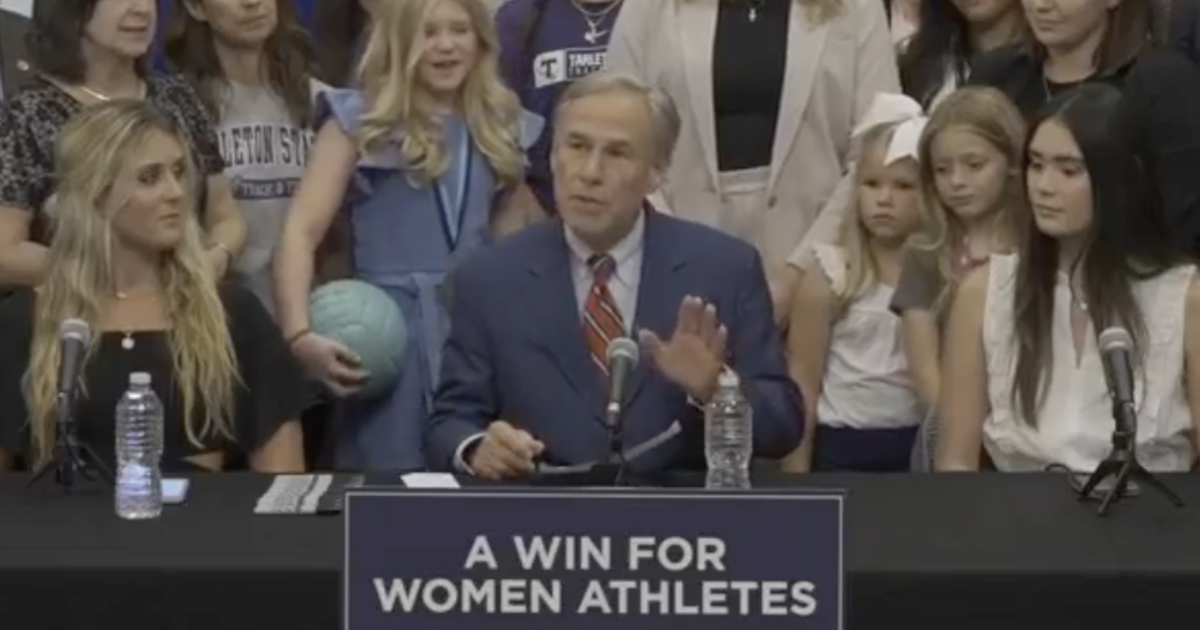

AUSTIN, Texas — Renowned National Collegiate Athletics Association swimmers Riley Gaines and Paula Scanlan praised Gov. Greg Abbott (R-TX) for banning transgender athletes from women’s collegiate sports teams and decried the fact that such a law was even necessary.
In a ceremonial bill signing held at the Texas Women’s Hall of Fame at a women’s university Monday, Abbott declared female teams at colleges and universities protected spaces, making Texas the biggest of the 16 states that have placed restrictions on transgender athletes in collegiate settings. The action was met by applause from girls and women in the room, while protesters demonstrated outside.
THE FOUR DEMOCRATS WHO COULD ATTEMPT TO UNSEAT BIDEN IN 2024 ELECTION
“Today feels like that one meet, that one race that you train all year for,” said Gaines, a competitive swimmer from the University of Kentucky, during the symbolic bill signing in Denton on Monday afternoon. “It’s pretty amazing that this law is even necessary. If you have eyes and a brain and any amount of common sense you can easily comprehend the fact that men on average, and this is a fact, are taller, stronger, are powerful, can jump higher than women. It’s biological reality, but unfortunately, we live in such a time where it is somehow controversial to say men and women are different.”
Fellow NCAA swimmer Paula Scanlan said she and her teammates felt the University of Pennsylvania was “gaslighting” athletes who complained about having to compete against Lia Thomas, a transgender woman.
Gaines complained that 6’4″ Thomas undressed and exposed “male genitalia inches away” from her while undressing in the locker room at a competition.
“When my teammates and I tried to voice our concerns to the athletic department, we were told that Lia’s swimming was nonnegotiable, and we were offered psychological services to reeducate us into accepting the idea of Thomas competing and undressing beside us,” Scanlan said. “We the women were the problem, not the victims.”
S.B. 15, known as the Save Women’s Sports Act by its supporters, will go into effect in September and was formally signed into law on June 15. It comes a year after the state first barred transgender K-12 students from playing on girls’ teams.
Texas joins more than 20 other states that have banned transgender women and girls from joining women and girls sports teams at K-12 and collegiate levels.
This law goes a step further than policies passed in other states in how it allows individuals to sue colleges and universities that permit transgender students to play on women’s teams.
Gaines hammered the NCAA and member schools for how she said they had purposely attacked women athletes in a way that violated the federal statute, Title IX, that protects people from sex-based discrimination at any education institution that receives federal funding.
“By allowing male athletes to displace female athletes in the pool or on the track and field or on that podium, the NCAA and its member colleges intentionally discriminate on the basis of sex,” Gaines said.
The third-term governor symbolically signed the bill, surrounded by nearly three dozen lawmakers and advocates. Outside several dozens protesters stood by with signs denouncing the policy.
“The legacy of women’s sports will be safeguarded for generations to come because of the law I am about to sign. Women in Texas can be assured that the integrity of their sports is protected in our great state,” Abbott said. “I wish that [the protesters] could have peacefully heard what Paula and Riley had to say.”
LGBT advocacy and civil rights groups, including the American Civil Liberties Union in Texas, have slammed Abbott for advancing the law, calling it “unfair, unconstitutional, and just plain cruel.”
Texas is the fifth state in 2023 to enact such a policy at the collegiate level. It first enacted a policy at the high school level in 2021.
States that do not allow transgender athletes to participate on women’s college teams are Alabama, Arkansas, Florida, Indiana, Kansas, Kentucky, Louisiana, Mississippi, Missouri, North Dakota, Oklahoma, South Carolina, South Dakota, and Tennessee, according to the Movement Advancement Project, a nonprofit think tank that advocates for transgender children and adults. Other states face lawsuits over K-12 or collegiate policies.
Lawmakers in Washington, D.C., have also acted to block transgender students. The House in April passed its first bill on the issue, but it has yet to be picked up by the Senate. President Joe Biden has vowed to veto the bill if the Senate passed it.
The Texas law could face major challenges in the fall when a Biden administration rule is expected to take effect and could rescind all state initiatives.
CLICK HERE TO READ MORE FROM THE WASHINGTON EXAMINER
Biden this year put forth a proposal in Title IX to override the state bans. The proposal is pending, but could officially go into effect in October.





